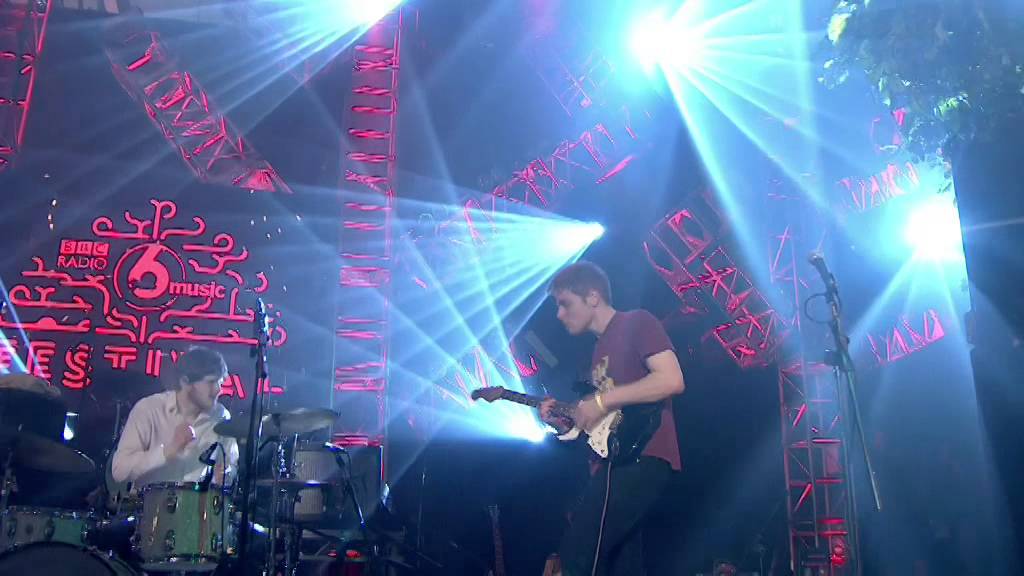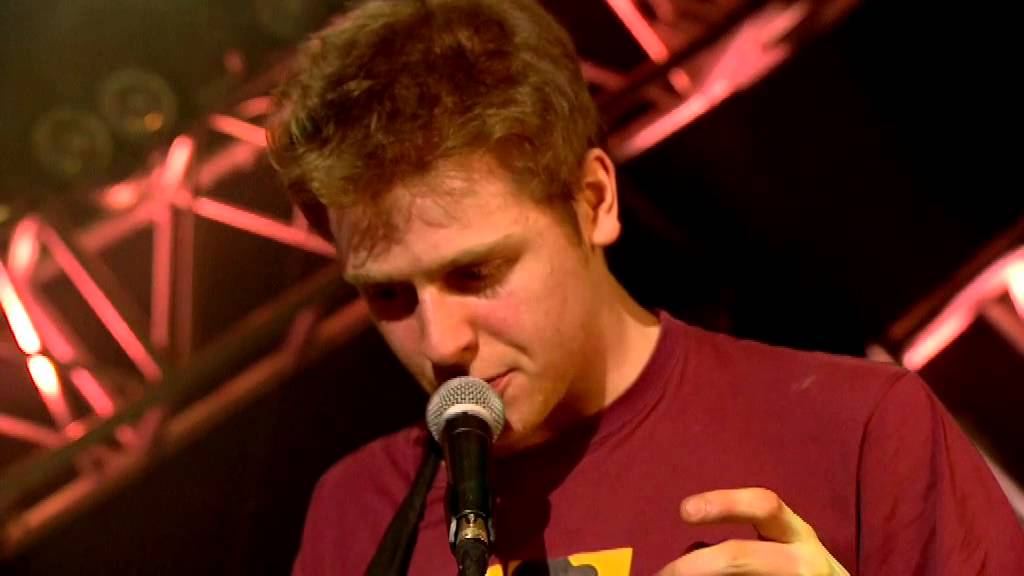I’m stood behind a huge mixing desk in the control room observing Marc Riley’s 6 Music radio show being recorded at the BBC’s swanky Media City HQ in Salford. A stunned silence fills the room as the sound engineer, the show’s producer and (for reasons not initially obvious to me) Private Eye cartoonist Tony Husband collectively process what they’ve just observed.
They’ve just seen Kiran Leonard and his band finish playing their third song in session. It was introduced as a new track entitled ‘Don’t Make Friends With Good People’ and turns out to be a staggering eight minute polymorph of spiralling folk, tense prog rock and thunderous garage punk. At the end of the song Riley himself seems a little speechless; not necessarily a good place to be for a radio DJ.
But, Kiran Leonard does inspire a certain amount of awe even in the most hardened of music industry types. His debut album Bowler Hat Soup – a riot of folk, blues and vaudevillian ballads set amongst dizzying chord structures and fractious, darting rhythms – felt like a record bursting at the seams with ideas. Out of Kiran’s earshot his band mates tell me in hushed tones about mind-bending practice sessions fuelled by Leonard’s freeform concepts and technical mastery.
After the Riley show, Kiran and I conduct our interview in the late evening sunshine on a concrete bench next to the Blue Peter garden. Our discussions begin at an atypical juncture – his as-yet-unfinished next album. "It’s called Grapefruit," he tells me in his soft Lancastrian accent. "A lot of [debut album] Bowler Hat Soup was inspired by American songwriters like Sufjan Stevens, Joanna Newsom and Van Dyke Parks and big, lush, textural ideas. Those things are still prevalent on Grapefruit but it is louder and more freeform and the tracks are a lot longer. There is more noise improvisation which I took from listening to people like Death Grips and Swans. Not that Grapefruit sounds like Death Grips – I need to make that point!"
And while we ponder the notion of a Death Grips-inspired album I decide to tackle the too-obvious-to-discuss aspect of Kiran Leonard – his age. Kiran is 18 and has been recording and releasing material since the age of 12. "I wrote [single and Riley favourite] ‘Dear Lincoln’ in June 2010, when I was 14, and Bowler Hat Soup first came out in January 2012 but was then picked up by the record label Hand Of Glory," he tells me in a manner that suggests he thinks that’s normal stuff. "Bowler Hat Soup may seem like a debut album, as it was my first LP, but it comes from a long line of self-released internet stuff and the songs are part of that lineage of fucking about and trying to find certain sounds that I like."
And while I’m aware that Kiran must have to field many questions about his youth, it’s fascinating to explore just how he has absorbed so much skill and knowledge in such a short space of time. The list of bands he was into at the age of 10 – The Mars Volta, Boards Of Canada, Shellac, Melt Banana, Boredoms to name but a few – makes my head spin. By comparison, I was listening to ABBA and Adam and the Ants. "It was just that I had a 20-year-old brother, so I missed the stage where you listen to shit music as a formative thing," Kiran says with a shrug," it’s not out of the ordinary for me. It’s just how I learned."
As for his technical expertise, the Saddleworth-based musician is proficient to the degree that Bowler Hat Soup contained 22 instruments – all played by his fair hand. Leonard is classically-trained only on mandolin ("I started playing when I was about five as my dad [the folk musician John Leonard] had this mandolin in the attic – I’m the fourth of five children and playing mandolin was almost a rite of passage"), but has only briefly had any music lessons ("with a wonderful teacher in Huddersfield called Nicky Wright – but we spent more time talking than playing"). However, Leonard is very, very proficient – I’m witness to his guitar-playing eliciting gasps from the BBC crew at the Riley show.
I’m slightly sceptical of the notion of playing 22 instruments on an album – mainly because I can barely name 22 instruments. "It was a super-gratuitous thing I did," Kiran explains, "A lot of it is derivative – there was a wall and a radiator." I tell him I’ve immediately discounted the wall and the radiator, but that 20 is still good going. Leonard, in typically self-deprecating fashion, shrugs of the compliment – "If you read the credits on 69 Love Songs [by The Magnetic Fields] then Stephin Merritt plays about 60 instruments – unbelievable."
During the Riley session Leonard is backed by his band – who are all ten years his senior and seasoned musicians – and is a whir of energy and intensity. "I really fucking hate it when bands just stand around, unless the music suits it," he tells me when I ask him how he approaches playing his music live. "For me, because the recorded versions of my songs have texture which I cannot recreate live, I make up for the lack of texture with brute force. That’s why there is so much of me flailing around – which is also quite cathartic and fun, as I’m not like that in person."
"The lack of texture also means I have to reinvent the songs, which has the added effect of not being bored of them," Kiran reveals. "I read an interview with Michael Gira in which he talked about how much the song ‘The Seer’ evolved after it had been recorded and not having the recording of the song as its end game. Traditionally, you put the recording out and it is done – it is encased in amber and you cannot fuck with it. I like that ‘Dear Lincoln’ is now not the same song as it was in June 2010 when I recorded it. It’s continued to evolve and that’s fun and interesting."
It’s hard not to be impressed by the wealth of knowledge Kiran has obtained since his brother sparked his musical education eight years ago. And while I bought my first record almost two decades before Leonard was born, I feel almost out of my depth when trying to keep pace with his encyclopaedic knowledge and speed of thought.
I try to keep things simple. We discuss a mutual hero, Steve Albini ("he’s level-headed as fuck, isn’t he?") and Leonard’s take on illegal downloading ("I see it as a library card to every piece of music ever recorded. I don’t think someone should have to think, ‘I’d love to listen to this album but I don’t have the money to buy it’, but I do completely understand why people get annoyed about it"), before returning to Kiran’s favourite subject – the future.
Leonard is planning to study Spanish and Portuguese at university in the autumn and I ask him if he had been tempted to become a full-time musician. "It’s like the Albini quote about his making music being akin to skiing or painting. That’s a really helpful way of looking at it. I feel like I’m not at a point where I could just go out and think, ‘Fuck it, I’m going to be a musician’, as what if in four years I run out of ideas? Or, I’m not able to survive independently? I’d rather go to university – and I’m really interested in Hispanic languages and culture anyway."
Kiran is adamant he will find a way to mix his studies with recording and touring, and that his Grapefruit album will soon see the light of day. And it seems Kiran is actually thinking further ahead. "I have got in mind what I want to make after Grapefruit and is entirely different. But it will sound ridiculous as it’s only partly thought through." I press him for more (ridiculous) details; it would be rude not to. "It’s going to be a very short record; it will be about 33 minutes long and contain 11 tracks and an ultimate level of instrumental diversity. It’s one of those things that I cannot articulate but I have a particular aesthetic in my head, which is what I do with all my records."
We begin to talk about how Kiran thinks his music has developed over the last few years, and what he is looking to achieve on these future albums. "My music teacher Nicky once showed me two paintings by Matisse," he recalls. "One was from early in his career and the other was painted two years before he died. Nicky pointed out elements in some of the patterns that spanned both paintings. It was as if Matisse had an aesthetic that he couldn’t visualise but he kept working towards. It was iteration – and when you iterate something you start with really wide bands but then get closer and closer. When I was trying to tell you what that next record is, I can’t explain it – I just know it exists and I’m working towards it, although I’m not saying I’m Henri Matisse, obviously."
I ask Kiran what would happen if he ever got to that central point. "I hope I never get there – as I won’t be able to write music anymore."
And that is a terrible, terrible thought.
Bowler Hat Soup is out now via Hand Of Glory. Leonard is currently midway through a UK tour – take a look at the dates below, and head to his website for tickets:
JULY
Thu 24 – The Horn, St Albans
Fri 25 – The Hop, Wakefield
Sat 26 – Gullivers, Manchester
Mon 28 – Cookie Jar, Leicester
Tue 29 – The Louisiana, Bristol
Wed 30 – Think Tank, Newcastle
Thu 31 – Electric Circus, Edinburgh
AUGUST
Fri 1 – Cloudspotting Festival, Slaidburn
Sat 2 – Visions Festival, London
Tue 26 – XFM X-Posure Live @ The Barfly, London
Fri 29-Sun 31 – End Of The Road Festival, Larmer Tree Gardens, Dorset
SEPTEMBER
Fri 5-Sat 6 – Festival Number 6, Portmeirion
OCTOBER
Sun 19 – A Carefully Planned Festival #4, Manchester





